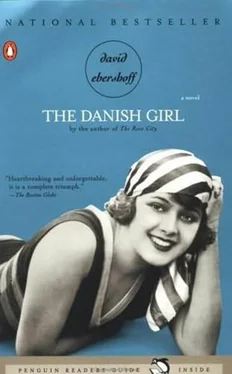Part Three. Dresden, 1930

Einar’s train entered Germany. It stopped in a brown field, the turned soil silver with frost. Outside, the sun was weak in the January sky, and the birch trees rimming the field huddled against the wind. All he could see was the flat of the fields and the reach of the gray sky. There was nothing else. Nothing but a diesel tractor abandoned in winter, its red metal seat trembling on its spring.
The border patrol checked passports on the train. Einar could hear the officers in the next compartments, their boots heavy on the carpet. They spoke rapidly but they sounded bored. There was the thin whine of a woman explaining her papers, and one of the officers saying, “Nein, nein, nein.”
Two officers arrived at Einar’s compartment, and there was a flutter in his chest, as if indeed he were guilty of something. The officers were young and tall, their shoulders pressed tightly into their uniforms, which looked to Einar uncomfortably starched. Their faces were shiny beneath the beaks of their caps, as shiny as the brass buttons on their cuffs, and Einar suddenly thought that the officers, who were barely out of their youth, were made of brass themselves: all gold and shiny and cold. They had a metallic smell, too, probably a government-supplied shaving cream. One of the officers had chewed his nails to stubs, and his partner’s knuckles were scraped.
Immediately Einar felt as if the officers were disappointed with him-as if, no matter what, he was incapable of causing any trouble. The one with the raw fingernails demanded Einar’s passport; when he saw it was Danish, he became even less interested. He opened it while looking at his partner. Neither of the officers, who were breathing through their mouths, checked the information in Einar’s papers, or held up the photograph, taken so long ago in a musty-smelling photographer’s studio steps from Rundetårn, to compare it to Einar’s face. The officers said nothing. The first one threw the passport into Einar’s lap. The second, whose eyes narrowed in on Einar, slapped his own stomach, the brass buttons on his cuff shaking, and Einar almost expected the dong! of a bell. Then the officers were gone.
Later, the train hauled itself into speed again, and the afternoon fluttered down over the fields of Germany, where in spring rows of rape would erupt with their violent yellow blossoms and their seductive scent of the nearly dead.
The rest of the ride Einar was cold. Greta had asked him if he wanted her to join him. Einar thought he had hurt her when he said no. “But why not?” she had asked. They were in the front room of the casita, and Einar didn’t answer. It was hard for him to say, but he thought that he might not have the courage to go through with it if Greta was with him; she would have reminded him too much of their previous life. They’d been happy, he kept telling himself. Einar and Greta had been in love. If she had come along, Einar feared, he wouldn’t keep his appointment with Professor Bolk; Einar might have instead told Greta they should switch trains in Frankfurt and head south, back to Menton, where the blank sunlight and the sea could make everything seem simple. As he was saying “No, I’ll go alone,” he could almost smell the lemon trees in the park in front of the municipal casino. Or, Einar might have said he was returning to Bluetooth, where now another family lived in the farmhouse next to the sphagnum fields; he might have tried to run away, and taken Greta with him, to the room of his youth where the feather mattress had been crushed thin and needly, and the wall by his bed was scratched with line drawings of Hans and Einar asleep on a rock; where the paint on the legs of the kitchen table was picked away from when Einar would hide under there and listen to his father call to his grandmother, “Bring me more tea before I die.”
Before Einar left Paris, Carlisle had asked him if he knew what he was getting into. “Do you really know what Bolk wants to do to you?” In fact Einar didn’t know the details. He knew Bolk would transform him, but even Einar had a hard time imagining just how. A series of surgeries, he knew. The removal of his sex, which more and more had come to feel parasitically worthless, the color of a wart. “I still think you might want to see Buson instead,” Carlisle had tried. But Einar had chosen Greta’s plan; in the night, when no one was awake in the world but the two of them, when they lay quiet beneath the bedclothes, their pinkies clasped, still there was no one he trusted more.
“Let me come with you,” Greta had tried one last time, drawing his hand to her breast. “You shouldn’t have to go through this alone.”
“But I can only do it if I’m alone. Otherwise…” He paused. “I’ll be too ashamed.”
And so Einar traveled by himself. He could see his reflection in the window of the train. His face was pale and thin around the nose. It made him think of a hermit who hadn’t lifted his face to the window of his hovel in many years.
Lying on the seat across from Einar was a Frankfurter Zeitung , left behind by a woman traveling with an infant. In the paper was an obituary of a man who had made a fortune in cement. There was a photo, and the man looked sad in the mouth. There was something in his face-the baby fat filling his chin.
Einar sat back in the seat and watched his reflection in the window. As the evening moved in quickly, the reflection grew more shadowy and angled, so that by dusk he didn’t recognize his face in the glass. Then the reflection disappeared, and outside lay nothing but the distant twinkle of a pork village, and Einar was sitting in the dark.
They wouldn’t know where to begin with his obituary, he thought. Greta would write a draft and deliver it to the newspaper’s desk herself. Maybe that was where they would begin, the young reporters with the thinning blond hair from Nationaltidende . They would take Greta’s draft and rewrite it, running the obituary and getting it wrong.
Einar felt the train rattle beneath him, and he thought of how his obituary should begin:
He was born on a bog. A little girl born as a boy on the bog. Einar Wegener never told anyone, but his first memory was of sunlight through the eyelet in his grandmother’s summer-solstice dress. The baggy sleeves with the eyelet holes reaching into the crib to hold him, and he could recall thinking-no, not thinking, but feeling-that the white eyelet of summer would surround him forever, as if it were another necessary element: water, light, heat. He was in his christening gown. The lace, woven by his dead mother’s tatting aunts, hung down around him. It hung past his feet, and it would later remind Einar of the lace drapes that hung in the homes of Danish aristocrats; the blued cotton would fall to the baseboard and then fan onto the black-oak planks of a floor polished with beeswax by a bony maid. In the villa where Hans had been born there were drapes like that, and Baroness Axgil would snap her tongue-which was the thinnest tongue Einar had ever seen, and nearly forked-against the roof of her mouth whenever he, the girl born as a boy on the bog, moved to touch them.
The obituary would leave out that part. It would also fail to mention Einar, drunk on Tuborg, pissing into the canal the night he sold his first painting. He was a young man in Copenhagen, his tweed pants bunching up on the waist, his belt pelted with a mallet and a nail to drill another notch. He was at the Royal Academy of Fine Arts on a scholarship for boys from the country; no one expected him to paint seriously, only to learn a trick or two about framing and foreground, and then return to the bogs, where he could paint the eaves of the town halls of northern Jutland with scenes depicting the Norse god Odin. But then, on that early spring afternoon when the air was still crystallizing in his lungs, a man in a cloak stopped by the academy. The students’ paintings were hanging in the hallways, up and down the walls of the open stairwell with the white balustrade where, years later, Greta would take Einar’s head into her hands and fall in love with him. Einar’s little scene of the black bog was up, in a frame of faux gold leaf he paid for with the money he’d earned from submitting to medical experiments at the Kommunehospitalet.
Читать дальше













